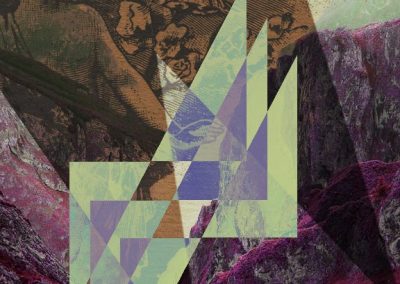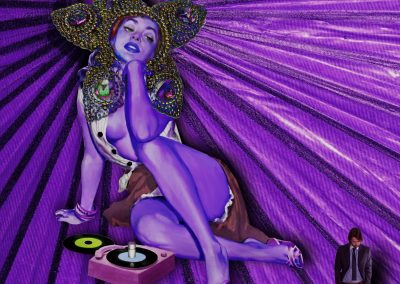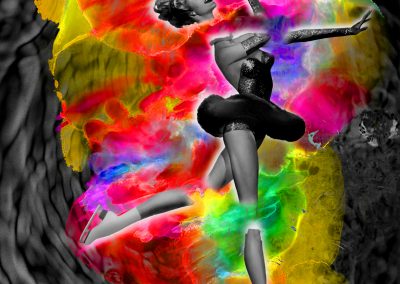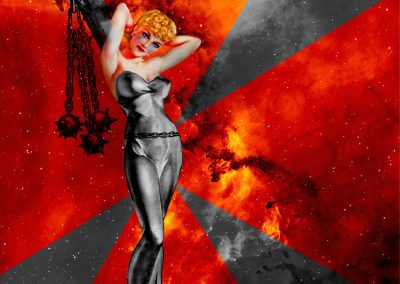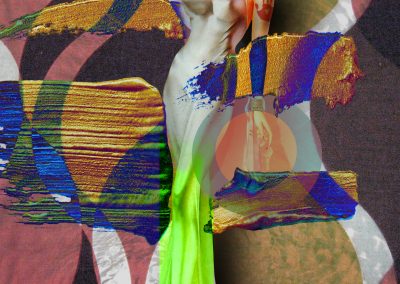Featured Artist
Britt Bender (she/they) is a genderfluid artist and writer from Upstate NY. Currently she writes part-time for the website Bleeding Cool about TV opinion and news. She’s finishing up her degree and plans to graduate in December of this year, 2020. As an artist, they work in paint, photo, creative writing, and even making and selling jewelry. Her personal artist business is BrittNic Creations, which has been a piece of her life for over five years now. She hopes to continue writing on TV news after graduation and to find a full time position doing such after the pandemic has calmed down.
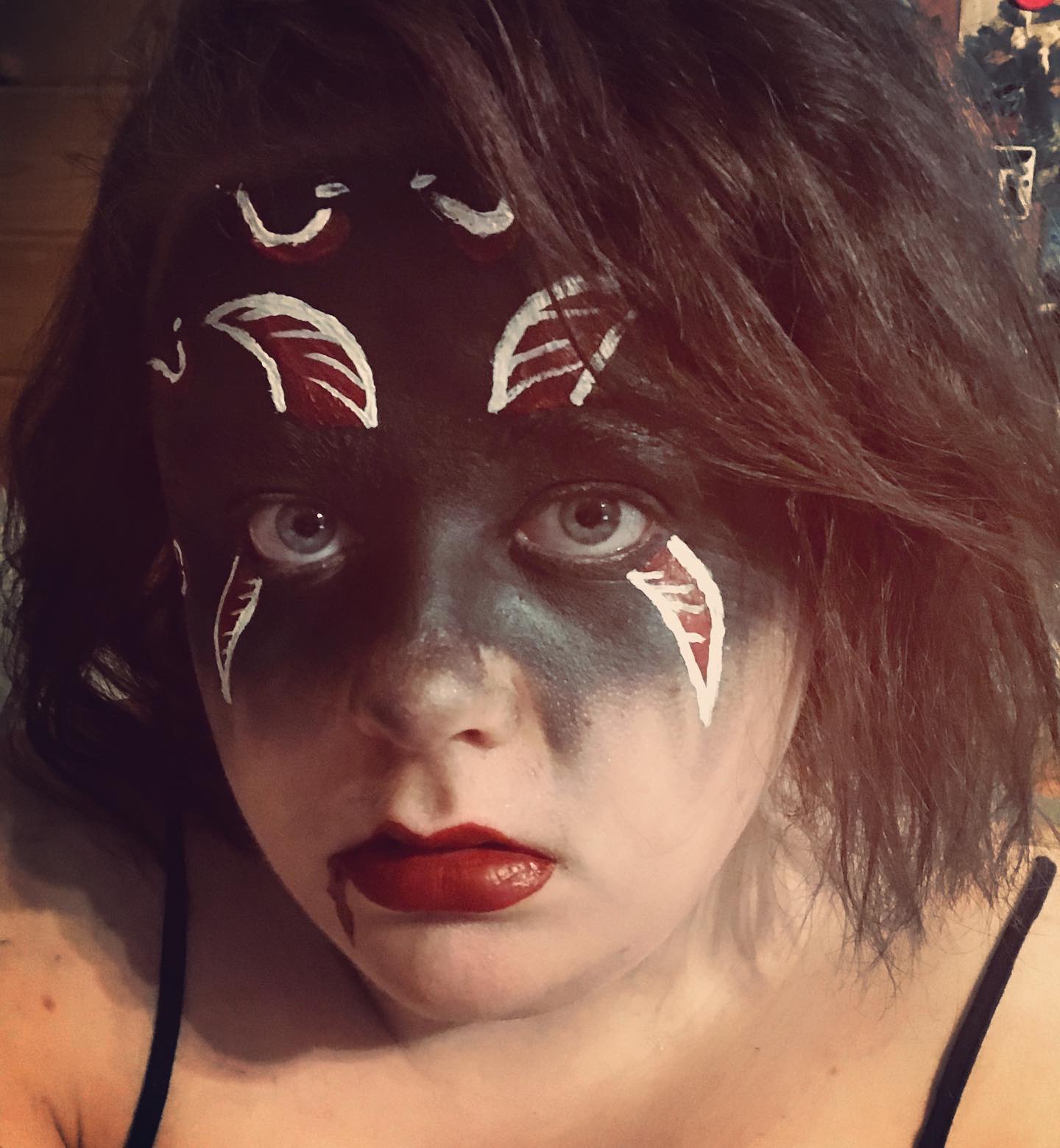
INTERVIEW
This semester, our literary magazine took on the theme of feminism by way of Bender’s artwork, so the ANGLES team decided to target our featured artist interview around building feminist alliances and educating our readers on the topic as well. ANGLES conducted an interview with Britt Bender, and also Spencer Bonawitz, a student currently enrolled at St. John Fisher College.
ANGLES: How does your gender identity interact with your identity as a student/ member of a college campus?
Britt Bender: Recently I’ve discovered that I wish to identify as gender fluid, an interesting discovery as I near the very edge of my college career. So, as a student and someone within the Fisher community (while also being away from it as a commuter) it has not been an easy thing. My gender identity felt a little all over the place, but the ways it was helped was through programs and acceptance of expression and gender brought on by people like Jenna Weintraub from student life.
Spencer Bonawitz: I suppose it makes me stick out; many people know me for dressing well and rather feminine compared to most cishet people. As someone who sees gender as something fluid and malleable, I like to think that that identity could lead to something of substance to the culture of Fisher. However, I never want to be considered just another diversity statistic that the college can tack onto their Niche.com ratings.
ANGLES: What does feminism mean to you?
BB: Feminism to me means that equality, true equality, comes through the lifting of others with one’s own privilege so that everyone has the ability to stand on equal grounds. When I don’t experience the same oppression as someone else, it doesn’t mean I go for answers from that group, it means I do my part as an ally and look for them and advocate for those people on my own and make sure others do the same. Feminism isn’t a way of life to be showcased entirely in the face of the world, it is something often done through less shown and less glamorous methods.
SB: Feminism is the equality of men and women while also being intersectional to ALL women. This includes women of color, transgender women, genderfluid women, and anyone in between. Men can certInly be feminists, and they should be doing the bare minimum and recognizing that while trying to make a positive change.
ANGLES: Why did you become a feminist?
BB: I think all along I was a feminist in my childhood but toxic social beliefs and a conservative christian past made it hard to acknowledge. Once I got to college, after being exposed in high school to thoughts on feminism, I expanded my views when I took a Women and Gender studies class. Often fear, and especially bigoted fear, comes from a line of silence and lack of knowledge. So, I became a feminist because I truly started to understood more about the foundational pieces of inequality around me and things clicked. When I realized more about ways I was privileged or how I internalized misogyny in my own life, the more my past actions made sense.
SB: I appreciate the basic human rights of everyone, and women are not boosted to the level they should be. Women like AOC and frankly powerful women that pop up on my twitter feed every now and then inspire me to continue being an active feminist. There are also so many circumstances where women’s bodies, identities, and livelihoods are under fire by government men, and that is something I completely hate. I wanted to stand up for people like my sister and mother so they can have the best lives they deserve.
ANGLES: Is there any difference between feminism and women empowerment to you?
BB: There is a difference between women empowerment and feminism to me. Feminism extends itself beyond the foundations of women empowerment in a way that includes trans individuals and intersex people. Not to say that women empowerment is something to strive for, but instead it is more of a way of progress within feminism itself.
SB: No. I think women empowerment and feminism are intersectional. I often see women who aren’t feminists (aka “Pick Me girls”) who continue to drag women down for showing off their bodies and being comfortable in their skin, and I think that is point blank proof as to why they are intertwined.
ANGLES: What is the best way to assess gender imbalance in education and the workplace and in your opinion what can be done to combat it?
BB: To look at imbalance in the workplace and educational institutions begins with looking at the facts of the environment like how many women, people of color, people with disabilities, neurodivergent, and more are involved there. From that point forward it remains important to open up opportunities and lift people out of the restrictions placed on those without given privileges. It is on higher ups to be held accountable and for people witnessing this to point it out and not blend in with the status quo or any organization that excludes.
SB: First of all we need to fix the wage gap. It’s such an outdated and BS thing and there is no solid evidence to show why women should be paid less. I also think that feminine health needs to be expressed more in health and science courses; too often are men CLUELESS about the function of the female anatomy, and it shows in their misogynistic views of women’s bodies. It would be helpful if schools stepped back and incorporated these topics into curriculum, and workplaces need to check themselves and fix their hegemonic misogyny. To combat it, I don’t really think there is much that the average person can do besides unionizing in the workplace and maybe speaking to administration in a school setting.’
ANGLES: In your opinion, what is the most important challenge that women face today?
BB: The most important challenge I believe women face today is the continuing inner sexist and misogynistic beliefs that can go unnoticed. Because they go unseen or ignored, women often hurt one another in the process. If women lift one another up and see the wrongs how society pits them against one another in many ways, then true progress can continue for feminism as a whole.
SB: Getting men out of power and being taken seriously. New Zealand in this COVID time is a prime example of why we need more women in serious places of power. However, men think women are too irrational but will go and drop bombs on the Middle East because they feel like it. Women in power could exponentially improve the function of this country, and I think countries like New Zealand and Iceland are prime examples of that.
ANGLES: In your opinion, What needs to change in the next 10 years?
BB: Honestly a lot needs to change in the next 10 years, but in reality only so much can be done because things sadly take time. I think an allowance of generations such as Gen Z and millennials need to be given the space to make these changes and step up into institutional roles so that the world makes progress. This will not only help individual countries, but will help global issues such as climate change. Climate change is one of the biggest threats currently, and without a healthy Earth there’s little hope to progress on other issues. But also while things like climate change are worked on, that doesn’t mean progress is halted on social issues and gender equality, it just means we can’t afford to ignore this one among all the others.
SB: Less old men, period. The wage gap closed. Free tampons and pads, no questions asked. Erasure of rape culture. Women in power. No more discussion of women’s bodies in politics. Men acknowledging their privilege. We have a long road ahead but I think it can be done.
ANGLES: What advice would you give to young women today?
BB: A large piece of advice I would give to young women today is that owning and loving your body is a difficult process because there’s a lot being pushed against that love by society. Once you begin to see how that world affects you, only then can you start to heal in a way that helps you own not only your gender identity but also your sexuality, whether asexual, pansexual, or anything in between. Being kind to yourself is one of the hardest but most rewarding things you can do.


